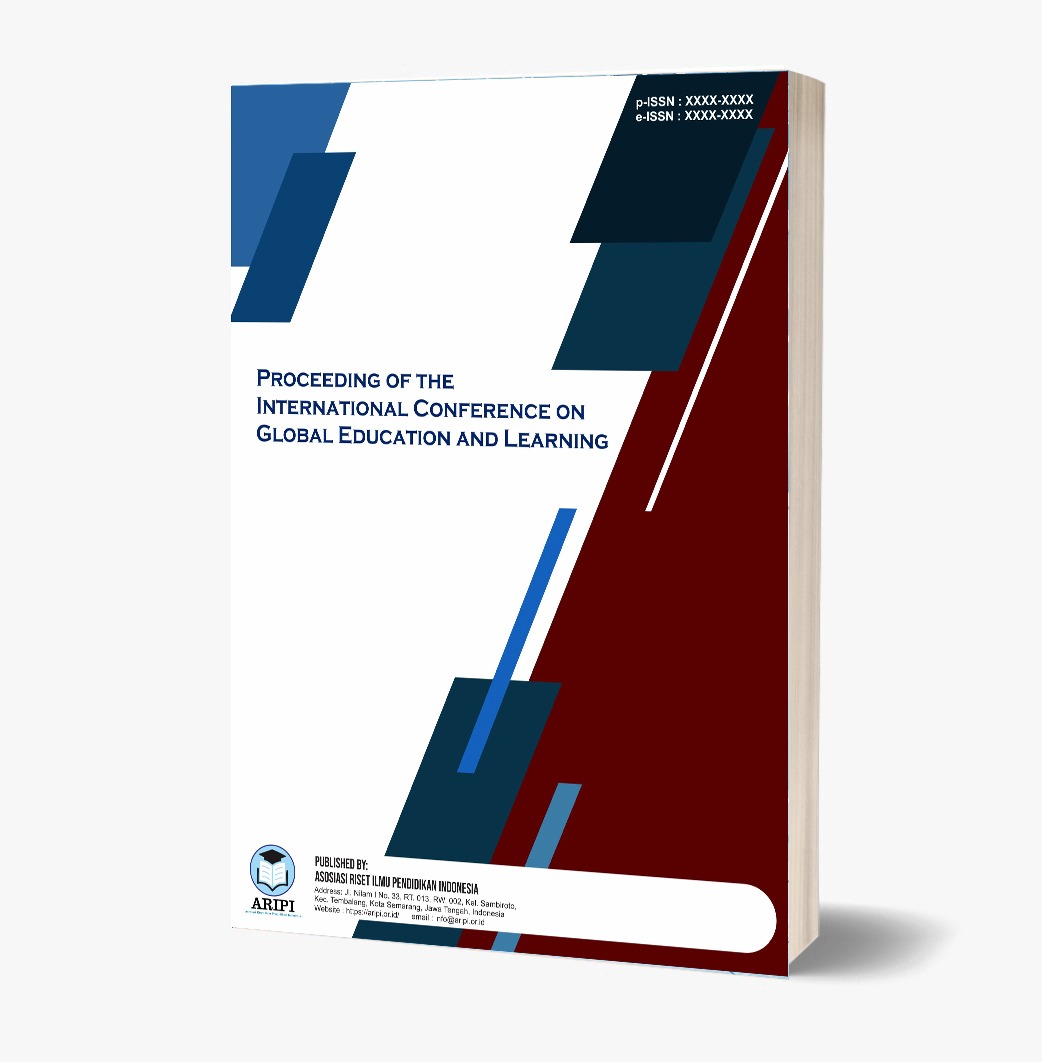Analysis of the Alignment of OBE-Based Curriculum with the Principles of Sustainable Development Goals in Higher Education
DOI:
https://doi.org/10.62951/icgel.v2i1.147Keywords:
Education, Curriculum, Sustainability, Pedagogy, PolicyAbstract
This study aims to evaluate the extent to which the principles of the Sustainable Development Goals (SDGs) are integrated into the Outcome-Based Education (OBE) curriculum of the Primary School Teacher Education Program (PGMI) at the Al-Zaytun Islamic Institute of Indonesia. Responding to the limited number of empirical curriculum studies linking OBE and sustainability, this research adopts a library research design supported by structured content analysis of curriculum documents, including Graduate Learning Outcomes (CPL), Course Learning Objectives (CPMK), and assessment rubrics. The analytical rubric was developed based on Education for Sustainable Development (ESD) indicators recommended by UNESCO. Findings indicate that only 30% of CPL and 22.7% of CPMK explicitly incorporate SDG values, with the dominant themes being inclusive education, social empathy, and critical thinking. The remaining components either indirectly address sustainability principles or primarily focus on technical pedagogical aspects. This reveals a misalignment between the curriculum’s current structure and the transformative vision of ESD and SDGs. Methodologically, this research contributes by offering a replicable rubric for assessing curriculum sustainability. Conceptually, it establishes a link between the OBE framework and sustainability values within Islamic teacher education. Practically, the findings provide actionable insights for curriculum developers and policymakers to enhance alignment with global sustainability agendas. The study emphasizes the strategic role of PGMI in fostering sustainability-oriented educators and advocates for systemic curriculum reform to produce future teachers equipped with the knowledge, values, and skills necessary to address contemporary global challenges. Strengthening the integration of SDGs within OBE-based curricula is essential for higher education institutions to actively contribute to the realization of a sustainable future.
References
Amirya, M., & Irianto, G. (2023, June). Tantangan implementasi Sustainable Development Goals (SDGs) di Indonesia. Jurnal Ilmiah Akuntansi Peradaban, 9(1), 187–198. https://doi.org/10.24252/jiap.v9i1.38916
Anggraini, D., & Nugraheni, N. (2024). Menuju pendidikan berkelanjutan: Implementasi tujuan pembangunan berkelanjutan (SDGs) dalam mewujudkan pendidikan berkualitas di Indonesia. Jurnal Penelitian Pendidikan Indonesia, 1(3), 189–197. https://doi.org/10.62017/jppi.v1i3.1028
Chairy, A., Istiqomah, I., & Nahdiyah, A. C. F. (2024, December). Sustainable development goals (SDGs) dan pendidikan Islam di perguruan tinggi: Sinergi untuk masa depan. Academia: Jurnal Inovasi Riset Akademik, 4(3), 124–134. https://doi.org/10.51878/academia.v4i3.3631
Fitriah, A., & Nugraheni, N. (2024, May). Peran pendidikan dalam mendukung Sustainable Development Goals (SDGs). Jurnal Ilmiah Multi Disiplin, 2(4), 202–209. https://doi.org/10.5281/zenodo.11141726
Herlambang, N. R., Sofwan, A., & Riyadi, M. A. (2023, September). Sistem evaluasi OBE prodi dan pengukuran CPL mahasiswa. Transient: Jurnal Ilmiah Teknik Elektro, 12(3), 119–127. https://doi.org/10.14710/transient.v12i3.119-127
Kioupi, V., & Voulvoulis, N. (2020, August). Sustainable development goals (SDGs): Assessing the contribution of higher education programmes. Sustainability, 12(17), 6701. https://doi.org/10.3390/su12176701
Mufanti, R., Carter, D., & England, N. (2024). Outcomes-based education in Indonesian higher education: Reporting on the understanding, challenges, and support available to teachers. Social Sciences & Humanities Open, 9, 100873. https://doi.org/10.1016/j.ssaho.2024.100873
Muhyani, M. (2023, October). Social entrepreneurship education based on sustainable development for PGMI students. Syekh Nurjati International Conference on Elementary Education, 1(0), 380. https://doi.org/10.24235/sicee.v1i0.14625
Muntoha, T. (2024, September). Mengokohkan perdamaian dan toleransi: Analisis literatur integrasi nilai-nilai SDGs dalam pendidikan agama Islam di era modern. Journal of Education Research, 5(4), 4642–4653. https://doi.org/10.37985/jer.v5i4.1608
Muzakir, M. I., & Susanto, S. (2023, May). Implementasi kurikulum Outcome Based Education (OBE) dalam sistem pendidikan tinggi di era revolusi industri 4.0. Edukasiana: Jurnal Islamic Education, 2(1), 118–139. https://doi.org/10.61159/edukasiana.v2i1.86
Nasrudin, E., Anwar, S., Suresman, E., Rahmi, U. Q., Hidayatulloh, D. S., & Ahmad Lokman, F. E. B. (2025, January). Integration of Sustainable Development Goals in Islamic teaching materials in higher education. Tafkir: Interdisciplinary Journal of Islamic Education, 6(1), 17–39. https://doi.org/10.31538/tijie.v6i1.1266
Negara, G. A. J., Pitriani, N. R. V., & Fitriani, L. P. W. (2024, April). Kurikulum berbasis OBE (Outcome Based Education) dengan nilai-nilai karakter untuk meningkatkan kualitas mutu pendidikan perguruan tinggi. Jurnal Penelitian Dan Pengembangan Pendidikan, 8(1), 41–48. https://doi.org/10.23887/jppp.v8i1.68767
Ningrum, M., & Hasanah, E. (2021, June). Manajemen kurikulum dan implementasi education for sustainable development pada perguruan tinggi. Didaktis: Jurnal Pendidikan dan Ilmu Pengetahuan, 21(2). https://doi.org/10.30651/didaktis.v21i2.7135
Nugroho, O. F., Permanasari, A., Firman, H., & Riandi, R. (2021, September). Persepsi dan praktik pendidikan keberlanjutan di Indonesia untuk education for sustainability development (ESD) selama pandemi Covid-19. Eduscience: Jurnal Ilmu Pendidikan, 7(01). https://doi.org/10.47007/edu.v7i01.4642
Prastowo, A. (2018, January). Transformasi kurikulum pendidikan dasar dan menengah di Indonesia. JIP: Jurnal Ilmiah PGMI, 4(2), 111–125. https://doi.org/10.19109/jip.v4i2.2567
Pratiwi, H., Dwiningrum, S. I. A., Riwanda, A., & Minasyan, S. (2024, April). Insights into multicultural competence of early childhood teacher candidates in Indonesian Islamic higher education. EDUKASI: Jurnal Penelitian Pendidikan Agama dan Keagamaan, 22(1), 79–96. https://doi.org/10.32729/edukasi.v22i1.1813
Putri, N. A., & Wahyuni, D. (2020). Eco-pedagogy dan global citizenship education dalam pembentukan guru SD literat keberlanjutan. Jurnal Pendidikan Guru SD, 8(3), 59–70.
Spady, W. G. (1994). Outcome-based education: Critical issues and answers. ERIC. https://eric.ed.gov/?id=ED380910
Taisir, M. T., Fitriani, M. I., & Quddus, A. (2024, December). Integrating environmental sustainability into Islamic religious education curriculum development. Jurnal Penelitian Keislaman, 20(2), 157–169. https://doi.org/10.20414/jpk.v20i2.11777
UNESCO. (2020). Education for sustainable development: A roadmap. https://doi.org/10.54675/YFRE1448
Utami Handayani, N., Handayani, N. A., & Sulardjaka, S. (2024). Sistem monitoring dan evaluasi proses belajar mengajar berbasis outcome based education di Fakultas Teknik Universitas Diponegoro. Jurnal Profesi Insinyur Indonesia, 2(3). https://doi.org/10.14710/jpii.2024.24263
Widodo, Y., & Kusnandar, K. (2021). Transformasi kurikulum berbasis nilai-nilai keberlanjutan dalam pendidikan tinggi. Jurnal Kajian Kurikulum Indonesia, 9(1), 16–28.
Wulf, C. (2010). Education as transcultural education: A global challenge. Educational Studies in Japan, 5, 33–47. https://doi.org/10.7571/esjkyoiku.5.33
Xuan, R. P., & Lindqvist, M. H. (2025, July). Exploring sustainable development goals and curriculum adoption: A scoping review from 2020–2025. Societies, 15(8), 212. https://doi.org/10.3390/soc15080212






